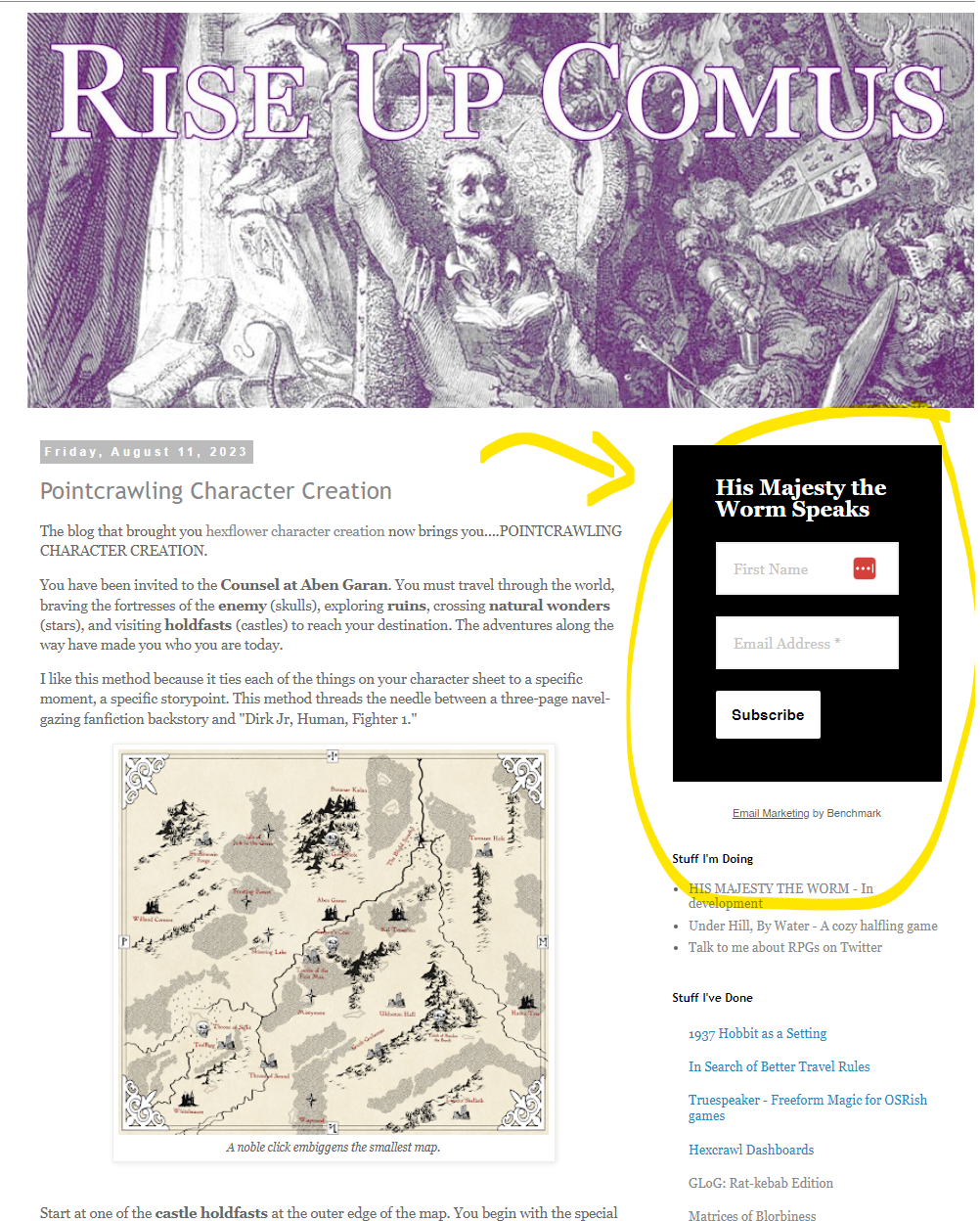His Majesty the Worm is a new-school game with old-school sensibilities: the classic megadungeon experience given fresh life through a focus on the mundanities and small moments of daily life inside the dungeon. This post is part of a series of deep dives into the mechanics of the game.
What do characters do?
Players take on the role of adventurers. Adventurers descend into the Underworld in search of impossible things that can never exist on the surface world. They explore collectively as a guild—a chartered union of adventurers. Adventurers fight monsters, avoid traps, get treasure, spend it all on drink, and maybe live long enough to do it twice.
This is all pretty bog standard stuff for folks used to games with dragons and dungeons.
I do think there are innovations in His Majesty the Worm that I want to talk about, though. There's something about the character lifecycle that's really compelling to me as a player and a game master. That's what this post is about.
Paths
Adventurers walk one of four paths.
- The Path of Swords is that of violence.
- The Path of Pentacles is that of slyness.
- The Path of Cups is that of learning.
- The Path of Wands is that of sorcery.
Your attributes are the four suits of the tarot. Think about them like jobs - fighter, thief, scholar, wizard. By putting points into them, you determine which job is your focus and which jobs are your back up. Your highest attribute determines your path.
When you select your path, you gain access to a set of talents that define your special abilities.
Quests
The GM creates the underworld - an exciting megadungeon to explore. The players create their quests.
Quests are your reason for going into the underworld. Normal, healthy-brained people don't want to go there. That place sucks.
The GM places your quest somewhere in the underworld. There, it sits fermenting, gestating, and shaping the world around it--sending out rumors like satellite signals to lure you towards it.
You get 3 XP for agreeing to help one player with their quest.
XP is spent as a resource to use talents that you do not have mastered. You get XP at the start of an adventure to help you use new talents during the adventure.
You get 3 XP whenever you complete a quest.
You also get 1 XP (much less) for taking on assignments for NPCs and for blowing all your coin on drink at the City. Little incentivizers.
When you have finished your quest, you're encouraged to retire your character. You've done what you've made that character to do. Retire them to the City and have the fun of playing a new type of dude for a little while.
In the last quest before we called the playtest "finished" (after 7 years!), one player defeated the Locust Lich that ruled the first level of the Underworld, rescued her dryad girlfriend, married her, and carved her tree into a figurehead for her pirate ship so the two of them could return to the surface and sail together forever.
That's the sort of stories I want to be a part of.
Wide, not deep growth
It’s worth noting that adventurers in His Majesty the Worm grow “wide” not “deep.” That is, XP allows you to use and master more talents, broadening the options available to you. You do not gain bigger numbers, +1s, more hit points, etc.
You can learn any talent in the game. Your path determines what talents you start with, but you can train with your other adventurers or NPCs to learn their talents too.
In my current campaign, I've put like 30 more talents into the game and seeded their trainers around the map. I'm having fun with players trying to find the right dude to teach them X talent.
Arête and beyond
In addition to XP, there are two other types of growth that adventurers benefit from. The first is arête, a feature of your kith.
Each kith (your larger racial group) has three arête triggers. For example, here's the ones for the fay kith:
When you check all of your arête, you gain a new talent specific to your kin. These unlockable talents are the only example of "deep growth" in the core game.
The second is “weirdness.” As you journey through the Underworld, you get weirder. You accumulate scars, mutations, magical items, pets, mutilations, phobias, etc. There are no rules governing the latter. Finding out how your adventurer gets weirder is essentially the whole game.
To be continued
My next deep dive is going to discuss the tech of the character sheet. What better way to learn about what characters do in the game? Stay tuned!
Want to learn more about His Majesty the Worm?
If this sounds interesting and you'd like to check the game out, please sign up for the mailing list in the sidebar of the blog. I will email you to tell you when the game is ready for purchase.


%20by%20Caitlin%20Reid.png)




No comments:
Post a Comment